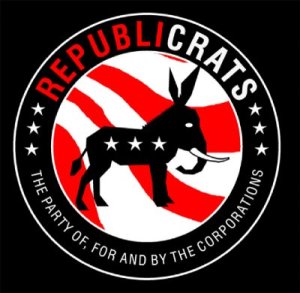It strikes me that the Republicrats (the Democrats and the Republicans) form an unfair monopoly.
While antitrust law is typically associated with corporations, it could, conceivably also be applied to government (the FTC is an independent government body).
Triggering the antitrust laws typically means that you have a monopoly (hard to argue against that for the Republicrats) and that you abuse that position. It has become abundantly clear over the last year that both parties are abusing their positions by focusing all of their energies on "win at any cost" as opposed to "do something for the country." This is also why they can be considered a single entity (for the purposes of a monopoly)...they are not really two parties; just one inward facing machine.
Unfortunately, it appears that there will not be any real third party, yet again, in the next election....so there is no motivation for either party to change their behavior. It also appears that you can't change the system "from within", which I believe was one of Obama's unstated goals. So, it needs to be changed from outside....and the FTC is the only thing I could think of :-/
If the FTC were shake things up a big, they would have to consider Durverger's law, which implies that the US political system is set up to converge to a two party system. Some changes to the "representative" system would have to occur.
While antitrust law is typically associated with corporations, it could, conceivably also be applied to government (the FTC is an independent government body).
Triggering the antitrust laws typically means that you have a monopoly (hard to argue against that for the Republicrats) and that you abuse that position. It has become abundantly clear over the last year that both parties are abusing their positions by focusing all of their energies on "win at any cost" as opposed to "do something for the country." This is also why they can be considered a single entity (for the purposes of a monopoly)...they are not really two parties; just one inward facing machine.
Unfortunately, it appears that there will not be any real third party, yet again, in the next election....so there is no motivation for either party to change their behavior. It also appears that you can't change the system "from within", which I believe was one of Obama's unstated goals. So, it needs to be changed from outside....and the FTC is the only thing I could think of :-/
If the FTC were shake things up a big, they would have to consider Durverger's law, which implies that the US political system is set up to converge to a two party system. Some changes to the "representative" system would have to occur.

Comments